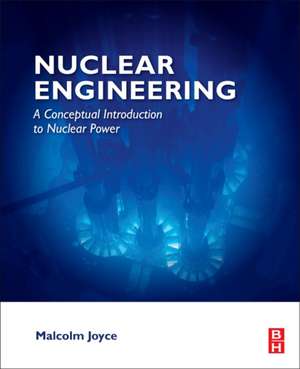Nuclear Engineering: A Conceptual Introduction to Nuclear Power
Autor Malcolm Joyceen Limba Engleză Paperback – 20 sep 2017
Intended for undergraduate students or early postgraduate students studying nuclear engineering, this new text will also be appealing to scientifically-literate non-experts wishing to be better informed about the ‘nuclear option'.
- Presents a succinct and clear explanation of the key facts and concepts on how nuclear engineering power systems function and how their related fuel supply cycles operate
- Provides full coverage of the nuclear fuel cycle, including its scientific and historical basis
- Describes a comprehensive range of relevant reactor designs, from those that are defunct, current, and in plan/construction for the future, including SMRs and GenIV
- Summarizes all major accidents and their impact on the industry and society
Preț: 337.28 lei
Preț vechi: 408.77 lei
-17% Nou
Puncte Express: 506
Preț estimativ în valută:
64.54€ • 67.39$ • 53.29£
64.54€ • 67.39$ • 53.29£
Carte tipărită la comandă
Livrare economică 08-22 aprilie
Livrare express 11-15 martie pentru 125.36 lei
Preluare comenzi: 021 569.72.76
Specificații
ISBN-13: 9780081009628
ISBN-10: 0081009623
Pagini: 420
Dimensiuni: 191 x 235 x 26 mm
Greutate: 0.88 kg
Editura: ELSEVIER SCIENCE
ISBN-10: 0081009623
Pagini: 420
Dimensiuni: 191 x 235 x 26 mm
Greutate: 0.88 kg
Editura: ELSEVIER SCIENCE
Public țintă
Undergraduate students and postgraduate students specializing in the nuclear field or taking specialist options within general engineering and physics coursesCuprins
1. Fundamental concepts
2. Historical context
3. Fundamentals of radioactivity
4. The fission process
5. The actinides and related isotopes
6. Moderation
7. Cooling and thermal concepts
8. Elementary reactor principles
9. The reactor equation and introductory transport concepts
10. Mainstream power reactor systems
11. Advanced reactors and future concepts
12. Nuclear fuel manufacture
13. Nuclear fuel reprocessing
14. Nuclear safety and regulation
15. Radioactive waste management and disposal
16. Public acceptability, cost and nuclear energy in the future
2. Historical context
3. Fundamentals of radioactivity
4. The fission process
5. The actinides and related isotopes
6. Moderation
7. Cooling and thermal concepts
8. Elementary reactor principles
9. The reactor equation and introductory transport concepts
10. Mainstream power reactor systems
11. Advanced reactors and future concepts
12. Nuclear fuel manufacture
13. Nuclear fuel reprocessing
14. Nuclear safety and regulation
15. Radioactive waste management and disposal
16. Public acceptability, cost and nuclear energy in the future
